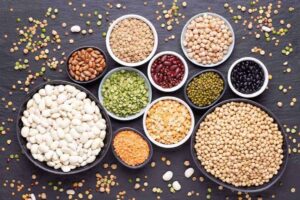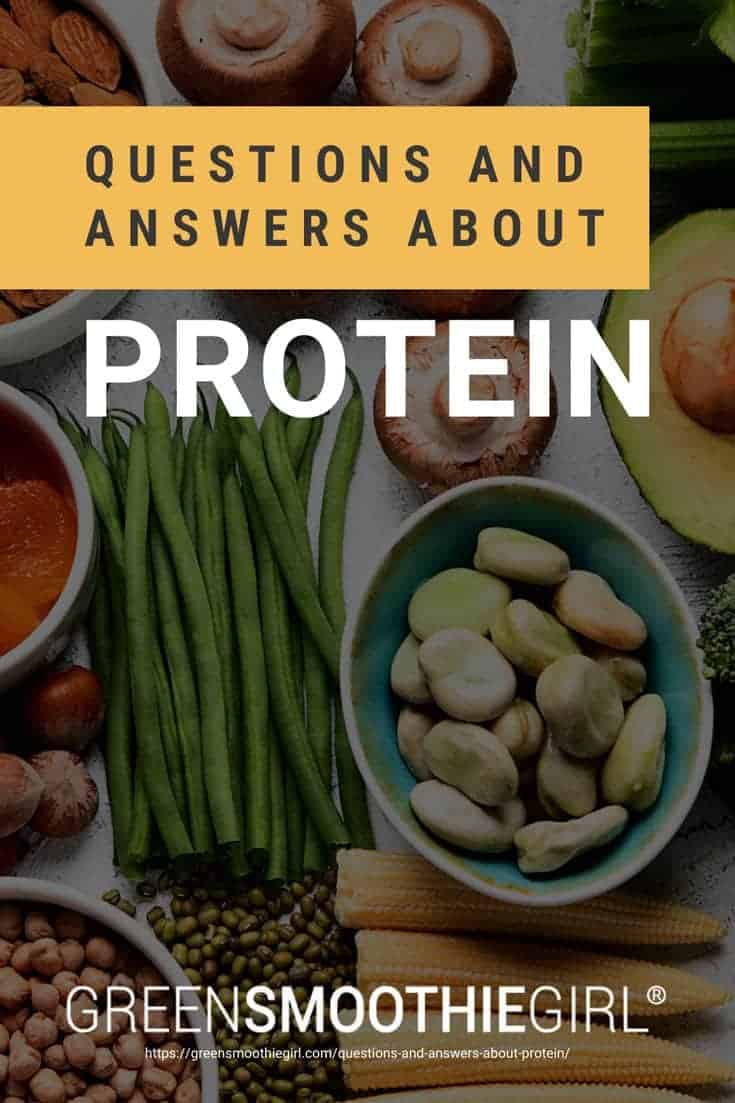Protein Questions and Answers: Myths and Truths

Protein is a much-talked about topic that most people don’t really understand.
Here are some common protein questions and answers to help clear some things up for you:
In this article:
- What about “perfect” or “complete proteins”?
- Should I be worried about getting enough protein?
- What if I feel better eating more protein?
- What about “eating right for my blood type”?
- One more benefit to not over-consuming protein
Question: What About “Perfect” or “Complete Proteins”? Are They the Best?
Answer: No, not at all. A “perfect” protein just means it very closely matches human flesh. In fact, proteins from plants, where the body builds from the “raw materials” of amino acids (protein’s building blocks) yield more durable muscle mass. They aren’t “perfect” proteins, but that doesn’t mean they are inferior. Quite the opposite.
Eating the flesh of animals does “bulk you up” more quickly. It also breaks down more quickly.
And eating the amount of animal protein that bulks up a bodybuilder also dramatically accelerates aging and increases disease risk.
(For a moment, stop looking at a bodybuilder or fitness competitor’s body, 99% of them who overload on animal proteins and whey protein powders. Look at their FACES. They look OLD.)
[Related: The Carnivore Diet: 11 Bizarre Claims of the All-Meat Diet]
Question: Should I be worried about getting enough protein?
Answer: Again, no. The World Health Organization says 5% protein is adequate!
Even an exclusively plant-based diet averages about 10%, especially if it contains decent amounts of greens, legumes, and nuts/seeds.
Virtually no one in the world has a protein deficiency. In fact, the average American eats 1.5 times more protein than we need. We do, however, have deficiencies in many nutrients found in PLANTS.
What does the average American eat, relative to the 5% “adequate protein” recommended by the most legitimized health organization in the world? Fully 20% animal protein! This is more than any culture in the history of the world has ever eaten.
And, the China Study (Cornell/Oxford collaboration) found, by tracking 6,500 people in China, that eating 20% animal protein is highly correlated to cancer, heart disease, and other risks.
On average, here’s how much protein plant foods contain:
- Fruits = 5 percent
- Vegetables = 20-50 percent
- Sprouts, nuts, beans, grains, seeds = 10-25 percent
So you get plenty of protein from plants. When you eat these proteins raw, they’re undamaged by heat and therefore more usable by your body, too.
Greens are highest in protein of the vegetables, so they are ideal for building and repair in the body. We have a protein excess in the Western diet, not a protein deficiency.

Question: What if I feel better eating more protein?
Answer: First of all, consider this. The research doesn’t say, only A blood types have high cancer and other disease risk if they eat a lot of meat. It’s ALL blood types who do.
The New York Times called The China Study, “the Grand Prix of Epidemiology.” It’s the biggest nutrition study in history, and its main macro implication is, high animal protein diseases lead to all the diseases of the modern age.
If you “feel better” eating more protein, it’s only temporary. It has nothing to do with your blood type. Or what your ancestors ate.
That diet has made its creator a lot of money, but it’s been very well and soundly debunked. (Sure, you feel better “eating for your blood type,” but that is because the diet eliminates refined carbs for ALL the diets. Virtually all Americans eat lots of processed carbs, and you will always feel better getting off them.)
The easiest way to explain why the Blood Type Diet is a sham is to ask you two questions and let you mull it over. Use your critical thinking skills.
First of all, are ALL your ancestors from the same place? How do people whose ancestors are from different continents prescribe their diet according to A, O, or AB blood? And, why did every one of the ancient cultures the authors refer to have ALL THE BLOOD TYPES? That’s right, ancient Asians had O, A, B, and AB blood. Ditto ancient Europeans. Hmmm. Makes you scratch your head, doesn’t it?
If you feel better eating a lot of protein, it’s because when you shift to eating a plant-based diet, your body immediately begins to detoxify. That process often initially involves weakness and fatigue. That’s simply a transition.
I felt the same way when I stopped eating animals, a temporary malaise. Now I virtually never eat any animals (a bite of red meat now and then makes me nauseous, which I couldn’t have imagined back in the days I ate a burger for lunch every day). And I have never had so much energy.
In my 20’s, I was exhausted by the things I now do on a daily basis, and love every minute of it! When I was 22, I was exhausted by the time I rented skiis, drove to the resort, and strapped on my boots. I did it to be with my friends, but secretly I wondered, “What’s fun about this?” That was my attitude towards much of my life! Now I ski 2-3 afternoons a week, after working out in the morning and doing my job all day, and I still have plenty of energy for my evening.
I’m just a case study. My experience isn’t everyone’s. I get that. I’m just using my own experience as an example. The principles in this answer are a synopsis of much reading and research, and they are solid and well documented. Unfortunately, some of the Food Cults of the past few decades have you legitimately confused, conflicted, and overwhelmed.
Give any shift towards nutrient-dense foods TIME. Be patient with temporary reactions that aren’t always comfortable. Proteins are needed to build and repair. But excesses of them rob the body of minerals.
Excesses of protein radically increases the risk of cancer, heart disease, type 2 diabetes, and autoimmune conditions, due to fragments of undigested proteins floating in the bloodstream en masse, far more than the body can metabolize.
If you do eat animal proteins, eat only range-fed and organic. This will massively increase your grocery bill, whereas legumes and whole grains, with 10 percent protein (which is ideal for digestion) are very inexpensive.

Question: What About “Eating Right for My Blood Type?”
Aren’t O blood types supposed to eat lots of animal protein, and A types do well as vegetarians?
Answer: I have written more extensively on this subject on the site. (Should I eat for my blood type?)
Let me give you the nutshell version of why experts like Dr. Joel Fuhrman have thoroughly debunked the junk science that underpins this fad diet. Before you get emotional about this because you feel better “eating for your blood type,” let me point out that EVERYONE will feel better eliminating processed foods, and thankfully, the D’Adamos tell All the blood types to eliminate processed carbs.
But the entire philosophy is based on where your ancestors came from. What to do about people whose mother and father are from two different continents/cultures? And what about the fact, just think about this, that ALL of those cultures had A, B, AB, and O blood types? It all falls apart here.
Certainly, people are all different and there is no “one size fits all” diet. If you are very emotionally attached to meat, eat it. Just eat very little of it (there is NO “type” who shouldn’t eat disease-preventative, low-environmental-impact raw plant foods, none!). And eat clean meat. (It’s very expensive.)
Question: Tell Me One More Benefit to Not Over-Consuming Animal Protein, to Pinkie Push Me into Eating More Legumes and Nuts and Seeds and Greens!
Answer: I confess I made this question up. No one has ever asked it of me before. It’s a totally opportunistic fake question designed so I can tell you THIS:
When the economic bubble supporting meat and dairy bursts, you’re not going to be able to afford meat or milk. It takes 20 pounds of plant food to yield one pound of beef. That’s why no other culture in the history of the world has eaten as much meat as we do!
(Yes, some cultures who lived on the water ate LOTS of fish, or whale blubber. But this was long ago, when fresh fish nutrition wasn’t heavily counterbalanced by terribly polluted waters.)
Do the math. If one pound of plants costs $1, then a pound of meat, with NO PROFIT for the rancher, should cost $20/lb.! Oops, we forgot to factor in that that same pound of beef also requires 1,000 gallons of water! You read that right. One thousand gallons.
So, when the U.S. government stops propping up meat and dairy with subsidies, people will be FORCED to stop eating it, unless they have a ranch with all the raw materials and can raise beef and pigs and chickens themselves.
We might want to just get used to eating low on the food chain now.
READ NEXT: Whey Protein Is Bad for You, Here’s Why

Disclosure: This post may contain affiliate links that help support the GSG mission without costing you extra. I recommend only companies and products that I use myself.

Posted in: Exercise, Health Concerns, Whole Food














